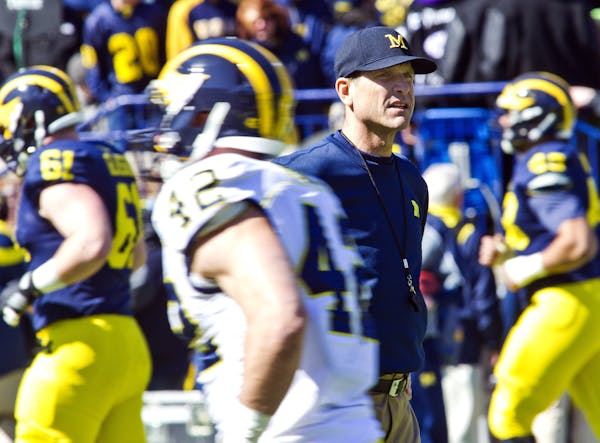Jerry Kill turns on the country charm and his audience can be left with the impression that he sort of stumbled into this job as a head football coach in the Big Ten.
Heck, if he's pouring it on thick, Jerry might tell you he would be as fired up to still be coaching the Cardinals of Webb City (Mo.) High School. At least then, he would not have had to go through the embarrassment of a university administration forcing him to accept a $900,000 raise, to $2.1 million per annum, as was the case 14 months ago.
You can take in all the cornpone, but four years and a few months after he arrived in Minneapolis, we know this: Jerry Kill is one sharp country boy, and being here as a head coach in a power conference at age 53 is part of a plan that was hatched long ago.
Matt Limegrover was coaching the offensive line at Ferris State in 1998. Kill was the head coach at Saginaw Valley State. Those schools were rivals in the Division II Great Lakes Athletics Conference.
Kill was making a lateral move to Emporia State after that season, to be closer to home and his father, who was suffering from cancer. He convinced Limegrover to join him at Emporia by offering this vision:
"When Coach called me, he said, 'If you come with me, you won't regret it. We won't be getting our gold watches at Emporia State. I love the process, I love the journey, and we can go somewhere special together.'
"I was sold when I heard that."
Kill turned 38 before the 1999 season started at Emporia. Divisions II and III are filled with 38-year-old head coaches with big aspirations. Most wind up getting dead-ended there, either getting gold watches or pink slips.
It took Jerry Kill and his band of loyal assistants a decade and stops at Southern Illinois and Northern Illinois to journey from Emporia State to the University of Minnesota.
Something special?
Against all odds, it appears Kill and his staff are on the verge of making that the case with the Gophers.
The odds went beyond the fact the Gophers had infrequently poked their heads above mediocrity during the prior four decades.
There was also Kill's health — first, the kidney cancer that he had to defeat, then the epileptic seizure that terrified the crowd for his first home game in 2011, and then another at TCF Bank Stadium in 2013.
He was waylaid by other seizures out of public view, and many of us presumed the process to make the Gophers relevant in football had been waylaid for another coach.
Kill was neither waylaid nor defeated.
This is the strongest foundation Minnesota football has had since 1967-68. The Gophers finished 6-1 and in a three-way tie for the 1967 Big Ten title and were 5-2 in 1968.
Candor requires an admission of a degree of trauma in offering this optimism.
I was like every other Minnesota kid in the '50s: What mattered most on fall Saturdays was the result of the Gophers football game. The upset loss at Illinois in 1957 was among the most traumatic events of my childhood.
That emotion had long since passed by 1979, when I received my license to comment as a Twin Cities sports columnist. Over the next three decades-plus, there was no subject more reliable for ridicule than Gophers football.
If you couldn't crank out a dozen columns per fall based on making fun of the gridiron Goofers, you should have turned in your keyboard.
Nobody offered up more fun than Tim Brewster. Coach Brew was a parody of a Big Ten football coach from his opening news conference/pep fest.
And now what do we have?
We have Jerry Kill — looking healthy, popular with all — with athletes who tackle and cover on defense, move people up front on offense, and with coaches who have taken two- and three-star recruits and turned them into effective Big Ten players and now are getting commitments from an occasional four-star.
The Gophers have been OK for two seasons, and they are going to be better this fall. They have a shot to win the Big Ten West. Good thing I'm a two-per-week columnist these days, because this is going to be a tough adjustment, using Gophers, football and contender in the same sentence.
Patrick Reusse can be heard 3-6 p.m. weekdays on AM-1500.

Reusse: Constant action is what keeps eyes glued to NBA playoffs
Reusse: Shaver was 'Voice of the North Stars' and an all-time great guy

Reusse: There's no doubt Finch is the right coach for the Wolves

Reusse: How bad are the White Sox? They made Twins look good.


